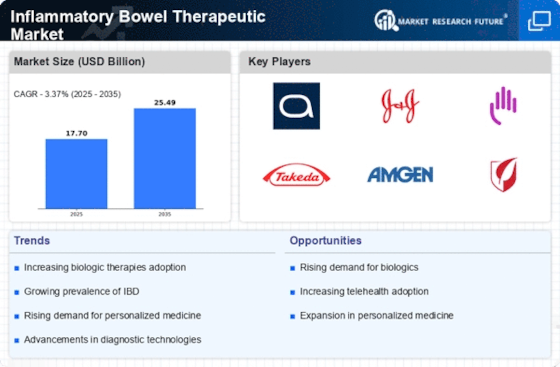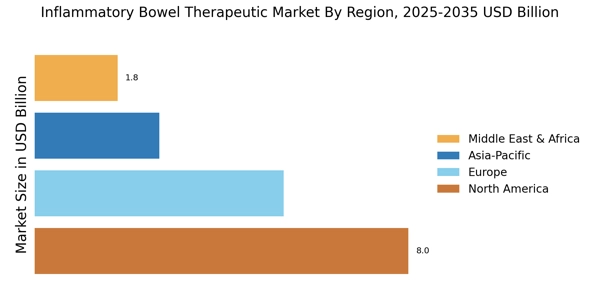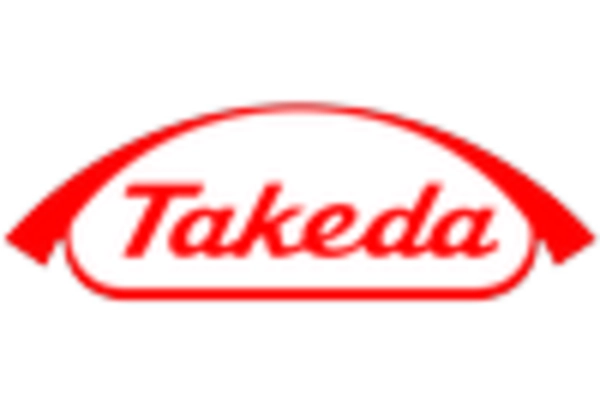Rising Awareness and Education
The increasing awareness and education surrounding inflammatory bowel disease are pivotal in shaping the Inflammatory Bowel Therapeutic Market. Healthcare providers and patients are becoming more informed about the symptoms, diagnosis, and treatment options available for IBD. This heightened awareness is leading to earlier diagnosis and treatment initiation, which is crucial for managing the disease effectively. Patient advocacy groups and educational campaigns are playing a vital role in disseminating information, thereby empowering patients to seek medical attention sooner. As a result, the demand for therapeutic interventions is likely to rise, as more individuals are diagnosed and treated for IBD. This trend is expected to stimulate growth in the Inflammatory Bowel Therapeutic Market, as pharmaceutical companies respond to the increasing need for effective therapies.
Advancements in Drug Development
Recent advancements in drug development methodologies are significantly influencing the Inflammatory Bowel Therapeutic Market. The emergence of novel therapeutic agents, particularly biologics and targeted therapies, has transformed treatment paradigms for IBD. For instance, the introduction of monoclonal antibodies has provided new avenues for managing severe cases of Crohn's disease and ulcerative colitis. Additionally, the integration of precision medicine approaches allows for tailored treatments based on individual patient profiles, enhancing therapeutic efficacy. The market is witnessing a surge in clinical trials aimed at evaluating new compounds, with hundreds of studies currently underway. This robust pipeline of investigational drugs is expected to expand treatment options and improve patient outcomes, thereby driving growth in the Inflammatory Bowel Therapeutic Market.
Regulatory Support for New Therapies
Regulatory support for the approval of new therapies is a significant factor influencing the Inflammatory Bowel Therapeutic Market. Regulatory agencies are increasingly recognizing the need for expedited pathways for innovative treatments that address unmet medical needs in IBD. Initiatives such as breakthrough therapy designations and fast-track approvals are encouraging pharmaceutical companies to invest in research and development. This supportive regulatory environment is likely to accelerate the introduction of novel therapies into the market, providing patients with more options for managing their condition. As new treatments gain approval, the Inflammatory Bowel Therapeutic Market is expected to experience substantial growth, driven by the influx of innovative products that enhance patient care.
Technological Innovations in Treatment Delivery
Technological innovations in treatment delivery systems are emerging as a key driver in the Inflammatory Bowel Therapeutic Market. The development of advanced drug delivery mechanisms, such as oral biologics and sustained-release formulations, is enhancing the efficacy and convenience of IBD treatments. These innovations aim to improve patient adherence to therapy, which is often a challenge in chronic conditions like IBD. Furthermore, the integration of digital health technologies, including mobile applications and telemedicine, is facilitating better management of the disease. Patients can now monitor their symptoms and treatment responses more effectively, leading to improved outcomes. As these technologies continue to evolve, they are likely to reshape the therapeutic landscape, driving growth in the Inflammatory Bowel Therapeutic Market.
Increasing Prevalence of Inflammatory Bowel Disease
The rising incidence of inflammatory bowel disease (IBD), including Crohn's disease and ulcerative colitis, is a primary driver of the Inflammatory Bowel Therapeutic Market. Recent estimates indicate that the prevalence of IBD has been steadily increasing, with millions affected worldwide. This growing patient population necessitates the development and availability of effective therapeutic options. As healthcare systems strive to manage this chronic condition, the demand for innovative treatments, including biologics and small molecules, is likely to surge. Furthermore, the economic burden associated with IBD management, which can exceed thousands of dollars annually per patient, underscores the urgency for effective therapies. Consequently, pharmaceutical companies are increasingly investing in research and development to address this unmet need, thereby propelling the Inflammatory Bowel Therapeutic Market forward.

















